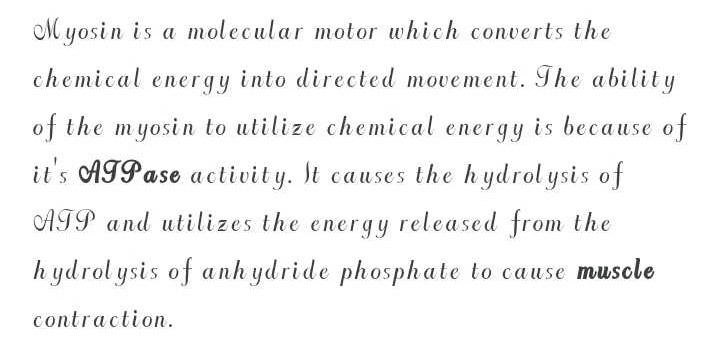NEET Exam > NEET Questions > Which muscle protein acts as ATPase ?a)Actin ...
Start Learning for Free
Which muscle protein acts as ATPase ?
- a)Actin
- b)Troponin
- c)Myosin
- d)Tropomyosin
Correct answer is option 'C'. Can you explain this answer?
Verified Answer
Which muscle protein acts as ATPase ?a)Actin b)Troponinc)Myosind)Tropo...
Muscle proteins and their functions:
- Actin: Actin is a thin filament protein that is involved in muscle contraction. It provides the framework upon which the myosin filaments slide during muscle contraction. Actin does not possess ATPase activity.
- Troponin: Troponin is a regulatory protein that is involved in muscle contraction. It helps to control the interaction between actin and myosin by binding to calcium ions. Troponin does not possess ATPase activity.
- Myosin: Myosin is a thick filament protein that is primarily responsible for muscle contraction. It possesses ATPase activity, which allows it to hydrolyze ATP and convert the energy released into mechanical work. This ATPase activity is crucial for the sliding of actin and myosin filaments during muscle contraction.
- Tropomyosin: Tropomyosin is another regulatory protein that is involved in muscle contraction. It helps to block the binding sites on actin, preventing the interaction with myosin in the absence of calcium ions. Tropomyosin does not possess ATPase activity.
Conclusion:
The muscle protein that acts as ATPase is myosin. It possesses ATPase activity, allowing it to hydrolyze ATP and provide the necessary energy for muscle contraction.
View all questions of this test
- Actin: Actin is a thin filament protein that is involved in muscle contraction. It provides the framework upon which the myosin filaments slide during muscle contraction. Actin does not possess ATPase activity.
- Troponin: Troponin is a regulatory protein that is involved in muscle contraction. It helps to control the interaction between actin and myosin by binding to calcium ions. Troponin does not possess ATPase activity.
- Myosin: Myosin is a thick filament protein that is primarily responsible for muscle contraction. It possesses ATPase activity, which allows it to hydrolyze ATP and convert the energy released into mechanical work. This ATPase activity is crucial for the sliding of actin and myosin filaments during muscle contraction.
- Tropomyosin: Tropomyosin is another regulatory protein that is involved in muscle contraction. It helps to block the binding sites on actin, preventing the interaction with myosin in the absence of calcium ions. Tropomyosin does not possess ATPase activity.
Conclusion:
The muscle protein that acts as ATPase is myosin. It possesses ATPase activity, allowing it to hydrolyze ATP and provide the necessary energy for muscle contraction.
Most Upvoted Answer
Which muscle protein acts as ATPase ?a)Actin b)Troponinc)Myosind)Tropo...

Free Test
FREE
| Start Free Test |
Community Answer
Which muscle protein acts as ATPase ?a)Actin b)Troponinc)Myosind)Tropo...
Myosin is a molecular motor which converts the chemical energy into directed movement. The ability of the myosin to utilize chemical energy is because of it's ATPase activity. It causes the hydrolysis of ATP and utilizes the energy released from the hydrolysis of anhydride phosphate to cause muscle contraction.

|
Explore Courses for NEET exam
|

|
Similar NEET Doubts
Which muscle protein acts as ATPase ?a)Actin b)Troponinc)Myosind)TropomyosinCorrect answer is option 'C'. Can you explain this answer?
Question Description
Which muscle protein acts as ATPase ?a)Actin b)Troponinc)Myosind)TropomyosinCorrect answer is option 'C'. Can you explain this answer? for NEET 2025 is part of NEET preparation. The Question and answers have been prepared according to the NEET exam syllabus. Information about Which muscle protein acts as ATPase ?a)Actin b)Troponinc)Myosind)TropomyosinCorrect answer is option 'C'. Can you explain this answer? covers all topics & solutions for NEET 2025 Exam. Find important definitions, questions, meanings, examples, exercises and tests below for Which muscle protein acts as ATPase ?a)Actin b)Troponinc)Myosind)TropomyosinCorrect answer is option 'C'. Can you explain this answer?.
Which muscle protein acts as ATPase ?a)Actin b)Troponinc)Myosind)TropomyosinCorrect answer is option 'C'. Can you explain this answer? for NEET 2025 is part of NEET preparation. The Question and answers have been prepared according to the NEET exam syllabus. Information about Which muscle protein acts as ATPase ?a)Actin b)Troponinc)Myosind)TropomyosinCorrect answer is option 'C'. Can you explain this answer? covers all topics & solutions for NEET 2025 Exam. Find important definitions, questions, meanings, examples, exercises and tests below for Which muscle protein acts as ATPase ?a)Actin b)Troponinc)Myosind)TropomyosinCorrect answer is option 'C'. Can you explain this answer?.
Solutions for Which muscle protein acts as ATPase ?a)Actin b)Troponinc)Myosind)TropomyosinCorrect answer is option 'C'. Can you explain this answer? in English & in Hindi are available as part of our courses for NEET.
Download more important topics, notes, lectures and mock test series for NEET Exam by signing up for free.
Here you can find the meaning of Which muscle protein acts as ATPase ?a)Actin b)Troponinc)Myosind)TropomyosinCorrect answer is option 'C'. Can you explain this answer? defined & explained in the simplest way possible. Besides giving the explanation of
Which muscle protein acts as ATPase ?a)Actin b)Troponinc)Myosind)TropomyosinCorrect answer is option 'C'. Can you explain this answer?, a detailed solution for Which muscle protein acts as ATPase ?a)Actin b)Troponinc)Myosind)TropomyosinCorrect answer is option 'C'. Can you explain this answer? has been provided alongside types of Which muscle protein acts as ATPase ?a)Actin b)Troponinc)Myosind)TropomyosinCorrect answer is option 'C'. Can you explain this answer? theory, EduRev gives you an
ample number of questions to practice Which muscle protein acts as ATPase ?a)Actin b)Troponinc)Myosind)TropomyosinCorrect answer is option 'C'. Can you explain this answer? tests, examples and also practice NEET tests.

|
Explore Courses for NEET exam
|

|
Signup for Free!
Signup to see your scores go up within 7 days! Learn & Practice with 1000+ FREE Notes, Videos & Tests.
























